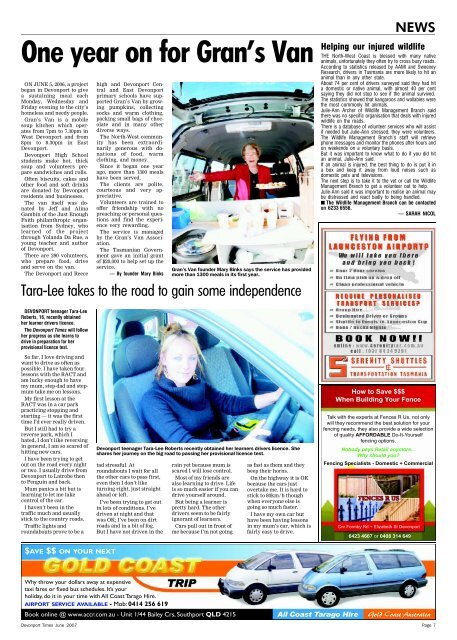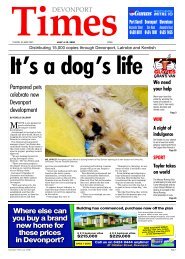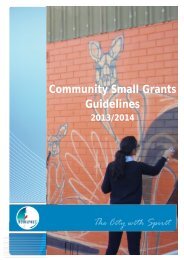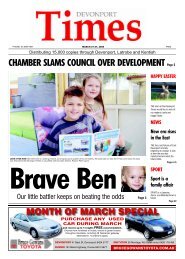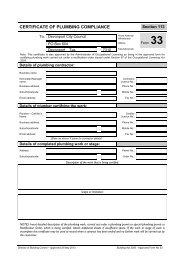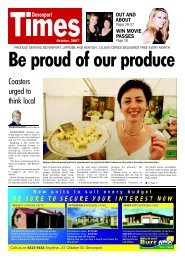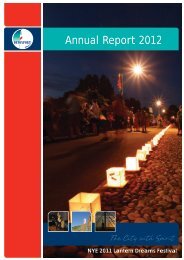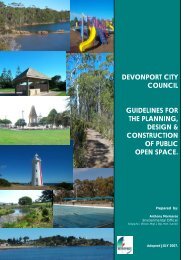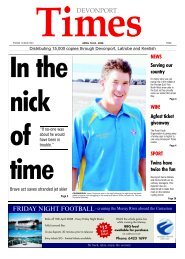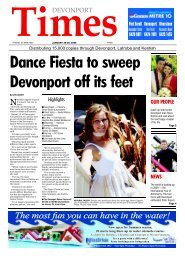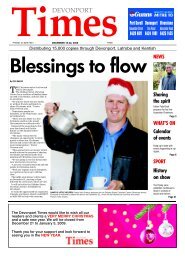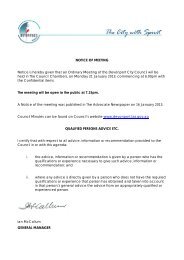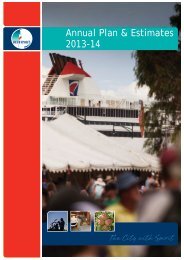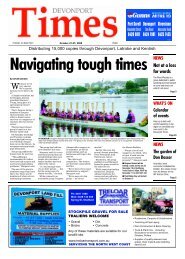Devonport Times - June - First Section - Devonport City Council
Devonport Times - June - First Section - Devonport City Council
Devonport Times - June - First Section - Devonport City Council
Create successful ePaper yourself
Turn your PDF publications into a flip-book with our unique Google optimized e-Paper software.
One year on for Gran’s Van<br />
ON JUNE 5, 2006, a project<br />
began in <strong>Devonport</strong> to give<br />
a sustaining meal each<br />
Monday, Wednesday and<br />
Friday evening to the city’s<br />
homeless and needy people.<br />
Gran’s Van is a mobile<br />
soup kitchen which operates<br />
from 7pm to 7.30pm in<br />
West <strong>Devonport</strong> and from<br />
8pm to 8.30pm in East<br />
<strong>Devonport</strong>.<br />
<strong>Devonport</strong> High School<br />
students make hot, thick<br />
soup and volunteers prepare<br />
sandwiches and rolls.<br />
Often biscuits, cakes and<br />
other food and soft drinks<br />
are donated by <strong>Devonport</strong><br />
residents and businesses.<br />
The van itself was donated<br />
by Jeff and Alina<br />
Gambin of the Just Enough<br />
Faith philanthropic organisation<br />
from Sydney, who<br />
learned of the project<br />
through Yolanda Da Rue, a<br />
young teacher and author<br />
of <strong>Devonport</strong>.<br />
There are 290 volunteers,<br />
who prepare food, drive<br />
and serve on the van.<br />
The <strong>Devonport</strong> and Reece<br />
high and <strong>Devonport</strong> Central<br />
and East <strong>Devonport</strong><br />
primary schools have supported<br />
Gran’s Van by growing<br />
pumpkins, collecting<br />
socks and warm clothing,<br />
packing small bags of chocolate<br />
and in many other<br />
diverse ways.<br />
The North-West community<br />
has been extraordinarily<br />
generous with donations<br />
of food, warm<br />
clothing, and money.<br />
Since it began one year<br />
ago, more than 1300 meals<br />
have been served.<br />
The clients are polite,<br />
courteous and very appreciative.<br />
Volunteers are trained to<br />
offer friendship with no<br />
preaching or personal questions<br />
and find the experience<br />
very rewarding.<br />
The service is managed<br />
by the Gran’s Van Association.<br />
The Tasmanian Government<br />
gave an initial grant<br />
of $20,000 to help set up the<br />
service.<br />
— By founder Mary Binks<br />
Gran’s Van founder Mary Binks says the service has provided<br />
more than 1300 meals in its first year.<br />
Tara-Lee takes to the road to gain some independence<br />
Helping our injured wildlife<br />
THE North-West Coast is blessed with many native<br />
animals, unfortunately they often try to cross busy roads.<br />
According to statistics released by AAMI and Sweeney<br />
Research, drivers in Tasmania are more likely to hit an<br />
animal than in any other state.<br />
About 74 per cent of drivers surveyed said they had hit<br />
a domestic or native animal, with almost 40 per cent<br />
saying they did not stop to see if the animal survived.<br />
The statistics showed that kangaroos and wallabies were<br />
the most commonly hit animals.<br />
Julie-Ann Archer of Wildlife Management Branch said<br />
there was no specific organisation that deals with injured<br />
wildlife on the roads.<br />
There is a database of volunteer services who will assist<br />
if needed but Julie-Ann stressed, they were volunteers.<br />
The Wildlife Management Branch’s staff will retrieve<br />
phone messages and monitor the phones after hours and<br />
on weekends on a voluntary basis.<br />
But it was important to know what to do if you did hit<br />
an animal, Julie-Ann said.<br />
If an animal is injured, the best thing to do is put it in<br />
a box and keep it away from loud noises such as<br />
domestic pets and televisions.<br />
The next step is to take it to the vet or call the Wildlife<br />
Management Branch to get a volunteer out to help.<br />
Julie-Ann said it was important to realise an animal may<br />
be distressed and react badly to being handled.<br />
■ The Wildlife Management Branch can be contacted<br />
on 6233 6556.<br />
— SARAH NICOL<br />
DEVONPORT teenager Tara-Lee<br />
Roberts, 16, recently obtained<br />
her learner drivers licence.<br />
The <strong>Devonport</strong> <strong>Times</strong> will follow<br />
her progress as she learns to<br />
drive in preparation for her<br />
provisional licence test.<br />
So far, I love driving and<br />
want to drive as often as<br />
possible. I have taken four<br />
lessons with the RACT and<br />
am lucky enough to have<br />
my mum, step-dad and stepmum<br />
take me on lessons.<br />
My first lesson at the<br />
RACT was in a car park<br />
practicing stopping and<br />
starting — it was the first<br />
time I’d ever really driven.<br />
But I still had to try a<br />
reverse park, which I<br />
hated. I don’t like reversing<br />
in general, I am so scared of<br />
hitting new cars.<br />
I have been trying to get<br />
out on the road every night<br />
or two. I usually drive from<br />
<strong>Devonport</strong> to Latrobe then<br />
to Penguin and back.<br />
Mum panics a bit but is<br />
learning to let me take<br />
control of the car.<br />
I haven’t been in the<br />
traffic much and usually<br />
stick to the country roads.<br />
Traffic lights and<br />
roundabouts prove to be a<br />
<strong>Devonport</strong> teenager Tara-Lee Roberts recently obtained her learners drivers licence. She<br />
shares her journey on the big road to passing her provisional licence test.<br />
tad stressful. At<br />
roundabouts I wait for all<br />
the other cars to pass first,<br />
even then I don’t like<br />
turning right, just straight<br />
ahead or left.<br />
I’ve been trying to get out<br />
in lots of conditions. I’ve<br />
driven at night and that<br />
was OK; I’ve been on dirt<br />
roads and in a bit of fog.<br />
But I have not driven in the<br />
rain yet because mum is<br />
scared I will lose control.<br />
Most of my friends are<br />
also learning to drive. Life<br />
is so much easier if you can<br />
drive yourself around.<br />
But being a learner is<br />
pretty hard. The other<br />
drivers seem to be fairly<br />
ignorant of learners.<br />
Cars pull out in front of<br />
me because I’m not going<br />
as fast as them and they<br />
beep their horns.<br />
On the highway it is OK<br />
because the cars just<br />
overtake me. It is hard to<br />
stick to 80km/h though<br />
when everyone else is<br />
going so much faster.<br />
I have my own car but<br />
have been having lessons<br />
in my mum’s car, which is<br />
fairly easy to drive.<br />
<br />
<br />
<br />
<br />
<br />
<br />
<br />
<br />
<br />
<br />
<br />
<br />
<br />
<br />
<br />
<br />
<br />
<br />
<br />
<strong>Devonport</strong> <strong>Times</strong> <strong>June</strong> 2007 Page 7


